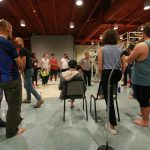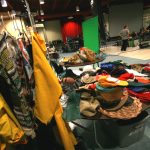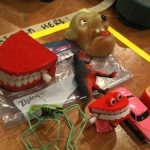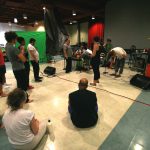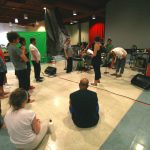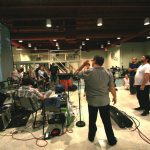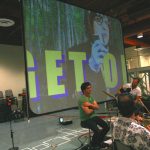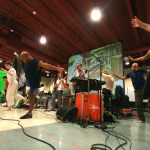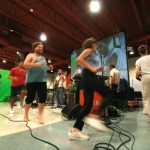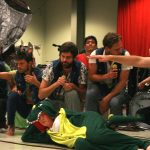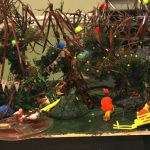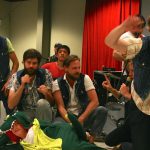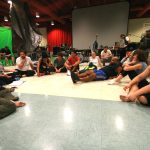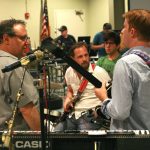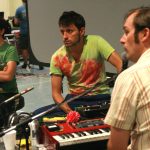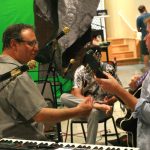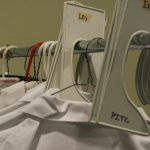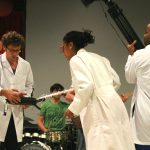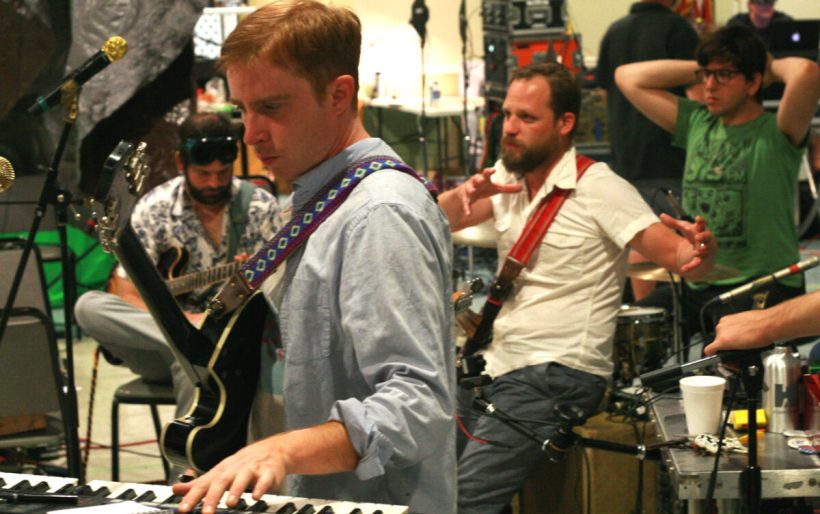
Dr. Dog and Pig Iron Theatre Company rehearsing for SWAMP (IS ON) | Photo by John Vettese for WXPN
Translating pop music in Dr. Dog and Pig Iron’s SWAMP (IS ON)
Dan Rothenberg remembers being utterly baffled the first time he sat down with Dr. Dog to listen to their “lost” debut, The Psychedelic Swamp.
The album is something of a holy grail for superfans of the Philly psych-rock faves, and it’s bizarre – no question about it. Released on cassette in 2001, it features warbly sounds and trippy textures, slap-back echo and tape delay, chopped-up audio collages mostly constructed by founding bandmates Scott McMicken and Toby Leaman in their West Philly halcyon days. Swamp has subsequently made the rounds on various unofficial YouTube playlists, and most recently arrived at the doorstep of renowned Philly troupe Pig Iron Theatre Company, where Rothenberg is artistic director.
“Scott and Toby were playing it for me and saying ‘trust us, there’s amazing songs in here,’ and I really couldn’t hear them,” Rothernberg recalls, laughing. “Then they would tell me it’s not meant to be listened to. And I don’t know what to do with that!”
Ultimately they arrived at an answer: translate the songs. Which is the mission of SWAMP (IS ON), the new collaborative production from Pig Iron and Dr. Dog premiering tonight at Union Transfer as part of this year’s Philly Fringe Festival.
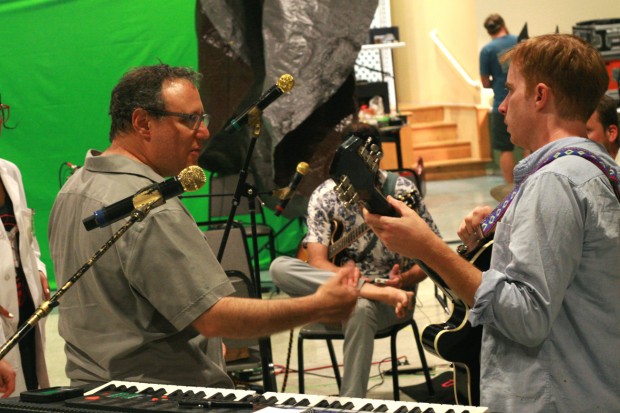
Dan Rothenberg, left, of Pig Iron Theatre Company directs Dr. Dog’s Scott McMicken during rehearsal for SWAMP (IS ON) | Photo by John Vettese
Though they operate in two distinct worlds – rock and roll and experimental theater – Dr. Dog and Pig Iron go way back. They first connected in 2003, when the band’s friend and roommate Bradford Trojan played guitar in one of Pig Iron’s half-cabaret, half-indie-rock shows, james joyce is dead and so is paris the lucia joyce caberet. Later, Leaman was involved in a Tom Waits-centric cabaret at The Rotunda in 2006.
“We were always like ‘we should do something, we should do something,” remembers Rothenberg. “Then we heard about this old cassette, the story of it and the story of the swamp. It seemed super exciting to all of the Pig Iron folks.”
“It’s been just this huge part of the band for so long, insofar as it’s always been this very open-ended thing,” says McMicken. “It has its tangible form, but within that tangible form is so much more to explore.”
McMicken says the band always held closely to the Swamp, waiting for the right time to dig in and revisit it, but being the general write-record-tour cycle of being in a rock band prohibited that.
“To stop and take several months to just kind of pursue something more on a whim is difficult,” says McMicken.
When a grant opportunity from the Knight Foundation came up, both band and theater company decided to jump at it. McMicken called it it “the perfect opportunity to finally suss this thing out some more, to see what it’s about and see what we could find within it.”
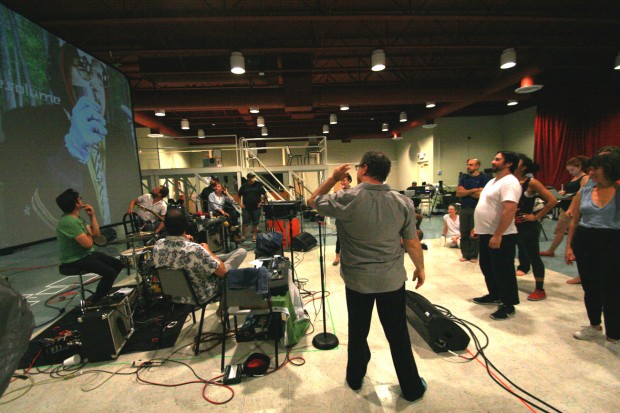
Eric Slick of Dr. Dog beneath a projection of himself during rehearsals for SWAMP (IS ON) | Photo by John Vettese
Walking up the steps to the band and production company’s Eraserhood rehearsal space earlier this month, I encountered a flurry of colorful activity. The band was centered in front of a projection screen with its instruments and microphones – behind were layers of projected video.
They were working on a song called “Badvertise…Sadvertise,” backed by footage of drummer Eric Slick clad in an alligator costume, making cartoonish faces while clutching a tin can. A bit later, the band – clad in matching denim vests – stepped to the front, with Pig Iron dancers circling them as they struck various synchronized poses. If I had to pinpoint, I’d say they were splitting the difference between Grease and One Direction, and keyboard player Zach Miller got particularly into that move where he points at the crowd and scans the room – it’s going to go over hugely at Union Transfer.
Rothenberg referred to this sketch as their “boy band” moment, though he reiterated that this was a very early attempt at staging it; it could be quite different by tonight. Likewise, the band was still figuring out the blocking of the title song, where scientists in lab coats wave geiger counter-ish instruments over a cassette deck to coax music out. On the album, its slow and meditative; in rehearsal, it seemed like fantastical pop that wouldn’t be out of place in The Monkees’ Head.
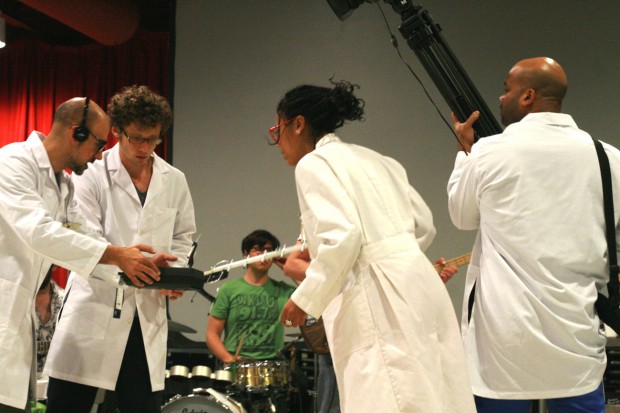
The Pig Iron Theatre Company cast rehearsing for SWAMP (IS ON) | Photo by John Vettese
The cassette of The Psychedelic Swamp came on the scene around the same time as Toothbrush, Dr. Dog’s other coveted early release. While that album is more of a loose collection of songs, a sort of best-of from five years worth of various home recorded tapes, Swamp was a unified work written / recorded in late 90s / early 00s.
McMicken says that, abstract as it all is, there was always a visual / narrative-driven concept behind the tape; he and Leaman once thought about storyboarding a film about it.
“It’s always sort of begged for that sort of treatment beyond just an album and sounds, but something to bring it to life,” he says.
Rothenberg nods, saying that this was exactly the appeal for Pig Iron.
“I think the band was more excited to do something in the theater world and we were more excited to do something in the rock concert world,” he says. “I think we’re able to kind of do them both, but we’re each definitely going beyond our comfort zones.”
The loose-knit story around SWAMP (IS ON) involves a hero, Phrases, who receives a cassette tape from outer space; it contains an encoded message that needed to be translated into music by Dr. Dog. (Sounds pretty familiar, right?)
“That idea just felt very close to a lot of Pig Iron plays,” Rothenberg says. “That there’s this thing that needs to be translated into something else and the message gets garbled along the way. Or you do your best to get the message, knowing there’s a pure intent somewhere, and that the audience can watch you try to make the message come through.”
The performance will feature a tape machine set on the Union Transfer stage, decked out in various props and oddities accumulated by Pig Iron scenic designer Matt Saunders. Dr. Dog and their gang of scientists will feed tapes into it, and they’re inviting the audience to participate by bringing their old cassettes to the show – “the ones you can say goodbye to, permanently” – ultimately creating this “Frankenstein of pop music.”
Beyond the contributing cassettes, other crowd-participatory elements are in the cards, breaking down that wall between audience and artist – something that’s not easy to pull off in a rock concert setting.
“At least not in as direct a way,” McMicken says. “I mean, you always hope for that connection, to where the barrier is broken on some level, but in this case it’s a much more direct approach.”
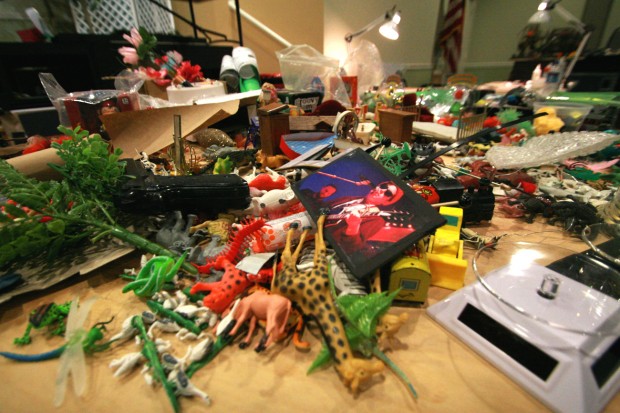
Inspiration for the look of SWAMP (IS ON) | Photo by John Vettese
The far wing of the rehearsal is Saunders’ work space, filled with trinkets and toys collected to inform the look of the set; some of it may be used, some may not, but all of it felt “very Dr. Dog” so to speak. Rothenberg thinks the band has a definite visual aesthetic as well as a sound aesthetic, from the artwork that McMicken and multi-instrumentalist Dimitri Manos make, to the ever-more-inventive stage sets they build on tour.
“I feel like there’s a handmade quality that we really love,” Rothenberg says. “It’s something we really respond to in Dr. Dog’s work. And so I think that Matt and I have definitely been thinking about how you can create that feeling where it’s being put together on stage in front of you.”
Likewise, McMicken admires Pig Iron’s ability to transport audiences in a way that works on dual levels – you see the process and inner workings at the same time as you see the bigger picture.
“It feels like you’re re-creating reality in a sense, in a much more direct way that a song being sung and a guy playing a guitar,” he says. “I mean, you can get there with that medium, but in this sense you have people talking to you and interacting and relating and you’re watching stories develop”
Ultimately, SWAMP’s tale of translating some tape from outer space is quite literally a parallel to Dr. Dog trying to translate its earliest ideas into something less freaky-outy. It’s something the band has done in the past – “Say Ahhh” and “Country Line” from Toothbrush are both staples of their live set, albeit in much different versions than we hear on record – but this is the first time the band has touched Swamp since committing it to tape some 15 years ago.
“This material has always been completely on its own,” McMicken says. “In fact, we felt pretty removed from it even at the time of making it. It’s always held somewhat of an out-of-body experience for us. Thinking back, there wasn’t a lot of conscious thought, there wasn’t any vision, it was a very responsive process; just a four-track, a keyboard and an acoustic guitar. The musical side was secondary to the energy that we had, which stumbled into this thing that sort of perpetuated itself.”
Scott says it was one of the most inspiring, creative times of his life, and because of that – and since Swamp always felt to McMicken and Leaman like less about individual pieces and more about the whole – it never felt right to cherry pick songs for re-imagining, the way they do with Toothbrush. He sees a lot of that feeling of fearless improvisation in watching the Pig Iron players work, where they aren’t “on book” so much as they are following a scenario where it takes them. Here’s where you’re starting, here’s where you have to end up, and the actors find a way to get there.
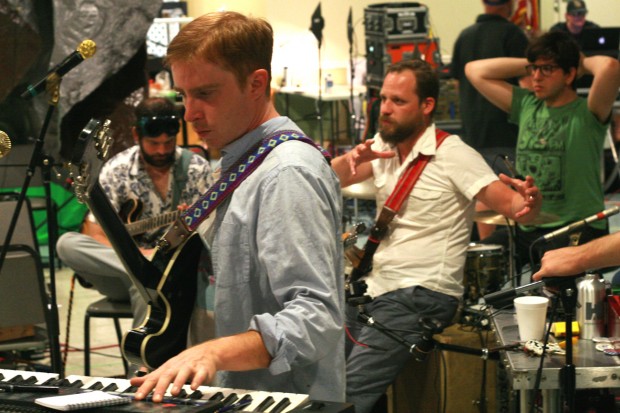
Dr. Dog rehearsing for SWAMP (IS ON) | Photo by John Vettese
“That’s pretty much the Pig Iron process,” Rothenberg says. “Try things on stage, and be open to following what works, what inspires. You can sort of feel when something clicks, when everyone in the room goes ‘yeah, okay, I get that.”
SWAMP (IS ON) opens tonight at Union Transfer and runs through Saturday; Friday and Saturday night’s performances are sold out, but tickets are still available for tonight and Thursday. More information can be found at the XPN Concert Calendar.
And for those who don’t make it to this one-time-only production, it will be preserved to some extent: McMicken says the band has been recording the post-Pig Iron versions of these songs in their Clifton Heights studio, and will release an album of it in the near future.
“Ultimately, that’s the self-filling prophecy of it,” McMicken says. “That we take this garbled cassette and translate it into American pop music, where the message can be understood. It’s an experiment in pop.”
It’s also the task assigned to them in the play by the hero, Phrases – getting the message of the tape into as many hands as possible.
“We have to be very heavy-handed in ensuring this music is accessible,” McMicken says, completely deadpan before breaking into a laugh. “Unless we end up the biggest band in the world, this whole thing’s a failure.”
- Dr. Dog and Pig Iron Theatre Company rehearsing for SWAMP (IS ON) | Photo by John Vettese for WXPN
- Dr. Dog and Pig Iron Theatre Company rehearsing for SWAMP (IS ON) | Photo by John Vettese for WXPN
- Dr. Dog and Pig Iron Theatre Company rehearsing for SWAMP (IS ON) | Photo by John Vettese for WXPN
- Dr. Dog and Pig Iron Theatre Company rehearsing for SWAMP (IS ON) | Photo by John Vettese for WXPN
- Dr. Dog and Pig Iron Theatre Company rehearsing for SWAMP (IS ON) | Photo by John Vettese for WXPN
- Dr. Dog and Pig Iron Theatre Company rehearsing for SWAMP (IS ON) | Photo by John Vettese for WXPN
- Dr. Dog and Pig Iron Theatre Company rehearsing for SWAMP (IS ON) | Photo by John Vettese for WXPN
- Dr. Dog and Pig Iron Theatre Company rehearsing for SWAMP (IS ON) | Photo by John Vettese for WXPN
- Dr. Dog and Pig Iron Theatre Company rehearsing for SWAMP (IS ON) | Photo by John Vettese for WXPN
- Dr. Dog and Pig Iron Theatre Company rehearsing for SWAMP (IS ON) | Photo by John Vettese for WXPN
- Dr. Dog and Pig Iron Theatre Company rehearsing for SWAMP (IS ON) | Photo by John Vettese for WXPN
- Dr. Dog and Pig Iron Theatre Company rehearsing for SWAMP (IS ON) | Photo by John Vettese for WXPN
- Dr. Dog and Pig Iron Theatre Company rehearsing for SWAMP (IS ON) | Photo by John Vettese for WXPN
- Dr. Dog and Pig Iron Theatre Company rehearsing for SWAMP (IS ON) | Photo by John Vettese for WXPN
- Dr. Dog and Pig Iron Theatre Company rehearsing for SWAMP (IS ON) | Photo by John Vettese for WXPN
- Dr. Dog and Pig Iron Theatre Company rehearsing for SWAMP (IS ON) | Photo by John Vettese for WXPN
- Dr. Dog and Pig Iron Theatre Company rehearsing for SWAMP (IS ON) | Photo by John Vettese for WXPN
- Dr. Dog and Pig Iron Theatre Company rehearsing for SWAMP (IS ON) | Photo by John Vettese for WXPN
- Dan Rothenberg, left, of Pig Iron Theatre Company directs Dr. Dog’s Scott McMicken during rehearsal for SWAMP (IS ON) | Photo by John Vettese for WXPN
- Dr. Dog and Pig Iron Theatre Company rehearsing for SWAMP (IS ON) | Photo by John Vettese for WXPN
- Dr. Dog and Pig Iron Theatre Company rehearsing for SWAMP (IS ON) | Photo by John Vettese for WXPN
- Dr. Dog and Pig Iron Theatre Company rehearsing for SWAMP (IS ON) | Photo by John Vettese for WXPN
- Dr. Dog and Pig Iron Theatre Company rehearsing for SWAMP (IS ON) | Photo by John Vettese for WXPN
